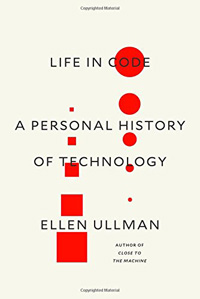 Ellen Ullman, Life in Code: A Personal History of Technology (New York: Farrar, Straus and Giroux, 2017), 306pp.
Ellen Ullman, Life in Code: A Personal History of Technology (New York: Farrar, Straus and Giroux, 2017), 306pp.
Back in 1979, Ellen Ullman was in a Radio Shack store when she discovered and then bought a TRS80 computer. What was this strange machine? What did it do? She knew nothing about computers. In fact, her honors thesis at Cornell had been on Macbeth. But she soon discovered that she loved "the deep pleasure of exploring machines."
Ullman taught herself to code, became very good at that narrow but powerful skill, and ended up living in San Francisco at the epicenter of the coding world for forty years. She was connected enough to know Larry Page and Sergey Brin, the founders of Google, on a first name basis, and be offered a job on the spot when she met them at a party back in 1999.
But Ullman never drank the koolaid of the techno-totalists that now defines our culture. Part of her critical distance to the coding world that she loved so much came from being a woman in a field that is dominated by men. Early on she observed the toleration of eccentric behavior, the oddball habits, the weird cult of a meritocracy that rewarded rogue behavior, and the outright disdain for anyone who was "far from the machine," in contrast to the coders who were "close to the machine." She experienced the "engineering loneliness" that was part of being a premier programmer. She lamented the disconnect between a coder's online, public persona and their real private self.
Ullman also came of coding age as the internet boom was just beginning, and very early on she feared what she was seeing and experiencing. The "baby world narcissism." The "glorification of the self, alone, at home." The "wild optimism" and "religious fervor" of the technocrats. She saw up close the endless hyperbole, the exaggerated individualism, the illusions of endless choice, the faith that technological problems are solved by technology and with more technology, and especially the "disintermediation" that removed all intermediaries (like other human beings) from the world of the internet.
These seventeen essays give an insider's critical account of the consequences of our technological society. We now live in a world that is defined by powerful technical means that are virtually unconstrained by any greater ends. Most of these essays are quite early, the first of which is from 1994. These earlier essays brim with both nostalgia and prescience (especially about the power of surveillance by corporations and governments). To take just one example, way back in 1998: "I fear for the world the internet is creating." The last five essays were written from 2012 to 2017. The New York Times listed this as one of the top books of 2017.


